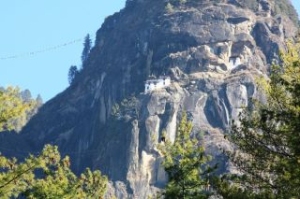WKU News
Keeling lectures at several stops on three-week global educational tour
- Thursday, March 15th, 2012
Dr. David Keeling, head of WKU’s Department of Geography and Geology, recently completed a three-week tour of Africa, Asia and the Middle East, covering more than 30,000 miles, representing the American Geographical Society as part of its geographic educational outreach program.

Tiger's Nest Monastery in Paro, Bhutan, was among the stops during Dr. David Keeling's three-week global educational tour. Access to the site required a hike of 1.5 miles from base camp ascending to 10,300 feet above sea level.
The educational tour began in Cairo, Egypt, with discussions about the Arab Spring and the profound changes occurring across the region. In Rwanda, the group visited the Volcanoes National Park to see and learn more about the mountain gorillas made famous by Dian Fossey’s research. Tour participants also learned about the causes and outcomes of Rwanda’s horrific genocide that killed more than a million people in 1994. Dr. Keeling gave lectures on how relevant geography is for the 21st century and how global climate change is impacting peoples and places in important ways.
Aboard a special expedition jet, the educational program continued on to Sabi San Reserve near Kruger National Park in South Africa to learn about resource management and the impacts of regional climate change. Climate themes dominated the group’s visit to the Maldives, which are threatened by rising sea levels. With average heights of just a few feet above sea level, the myriad islands of this northwestern Indian Ocean country are threatened by long-term rises in sea level. Many of the islands that house tourist resorts may be uninhabitable within 50 years.
A visit to the elephant environments of Chiang Rai, northern Thailand, followed by three days in Bhutan, the country of “Gross National Happiness,” focused attended on World Heritage site management and the challenges of over-visitation. Dr. Keeling lectured on Nationalism and Identity in a Globalizing World and shed light on recent events in Pakistan, India and Tibet, as well as ongoing conflicts around the world involving territorial claims and ethnic tensions.
In Rajastan, India, the group visited Jodphur and the Thar Desert, and learned about the challenges of sustainable growth, population and economic dynamism. In Jordan, site of the ancient Nabatean city of Petra, he lectured on the causes and impacts of the Arab Spring and discussed why the Middle East is trying to reinvent itself for the 21st century but is struggling to cope with changing global financial circumstances. The expedition ended in London, England.
The primary mission of the American Geographical Society’s educational travel programs is to focus attention on some of the planet’s most pressing problems, such as the social implications of climate change for small island communities, ongoing ethnic tensions in Asia, Africa and the Middle East, and the challenges for Islam in engaging with an increasingly Westernized global economy. A secondary mission is to demonstrate how geographers address these issues and to promote a broader geographic perspective on sustainable development issues.
“Learning about resource conflicts first-hand by examining, for example, India’s changing economy within a global context really helps people to understand the issues of sustainability and global change and puts the challenges we face as a global society into sharper focus,” Dr. Keeling said.
One of the benefits for WKU, Dr. Keeling said, is that the university’s growing international reputation is further enhanced through his participation in these educational tours. Students also benefit from the knowledge gained from these experiences and subsequently shared in the classroom and through research projects and study abroad programs.
Past educational expeditions have led to successful departmental study abroad programs to Chile, Argentina, Tanzania, Turkey and Australia, among other destinations.
Contact: David Keeling, (270) 745-4555.
Some of the links on this page may require additional software to view.

